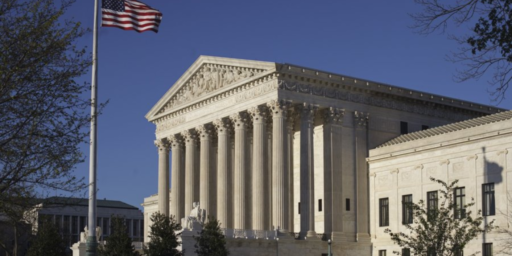Acquitted Parolees Sent Back to Jail
Chuck Lindell of the Austin American Statesman reports on the strange and outrageous case of Jimmy Lee Page, a man who was found not guilty of murder twenty years ago but was never released from prison.
Now 52, Page is in prison today because state officials revoked his parole — trumping the jury’s verdict with their own finding of guilt. It’s a common practice. Last year, 91 Texas parolees were returned to prison after being charged with a new crime, even though the charges against them were later dropped or they were acquitted in court.
Bound by looser rules than a court of law, parole officials reached their verdict on Page after hearing testimony from only one witness, a police detective who declares Page is “guilty as homemade sin.” In the years since, he was denied parole a dozen times, most recently in early 2006.
Jimmy Lee Page is not a good man. He was convicted of murder in 1975 and sentenced to life in prison, of which he served eleven years before being paroled. It may well be that he deserves to still be in prison for that first murder. Regardless, the reason he’s actually in prison is not that murder but a second one which he almost surely did not commit and for which he was acquitted.
Lindell addresses the shoddiness of the parole hearing process in his lengthy piece, noting that the system gives undertrained people mere moments to look at a case before making a decision and moving on to the next, making the status quo the easiest outcome. There’s essentially no due process, no public inspection, no confronting of witnesses, and no way to correct even egregious errors in files.
TalkLeft‘s TChris states that,
Although the Supreme Court required parole revocation hearings to provide at least rudimentary due process, the liberty of a parolee is viewed as “conditional,” and it can be taken away (without a jury trial) if the government proves that the parolee probably violated a condition of parole. The right to confront a witness is essential to a fair trial, but confrontation is often limited or nonexistent at revocation hearings.
Amazing.




Parole revocation hearings have very loose due proccess, and they also have a lower standard of proof to revocate-more along the lines of preponderance of the evidence rather than reasonable doubt.
It wouldn’t be that difficult to get revoked.
I am curious though that these men were still on parole, if the convictions were revoked. I would think an overturning of the conviction would result in a severance with any further supervision in the community.
I am curious though that these men were still on parole, if the convictions were revoked.
The conviction wasn’t revoked for the 1975 crime. His parole was revoked because of an alleged 1987 crime of which he was acquitted.
If putting Jimmy Page in prison is what it takes to prevent him making a fool of himself in an ill-conceived Led Zeppelin reunion, I’m all for it.
I see little problem in this – the guy’s sentence hasn’t expired yet; and parole is a privilege, not a right. A privilege which a lot of people take for granted, of course, but still just a privilege – and, no, ‘fair’ness ought not enter into it.
parole is a privilege, not a right
Sure. But it’s essentially a right once granted. Revocation should come from violating its terms, not random whim.